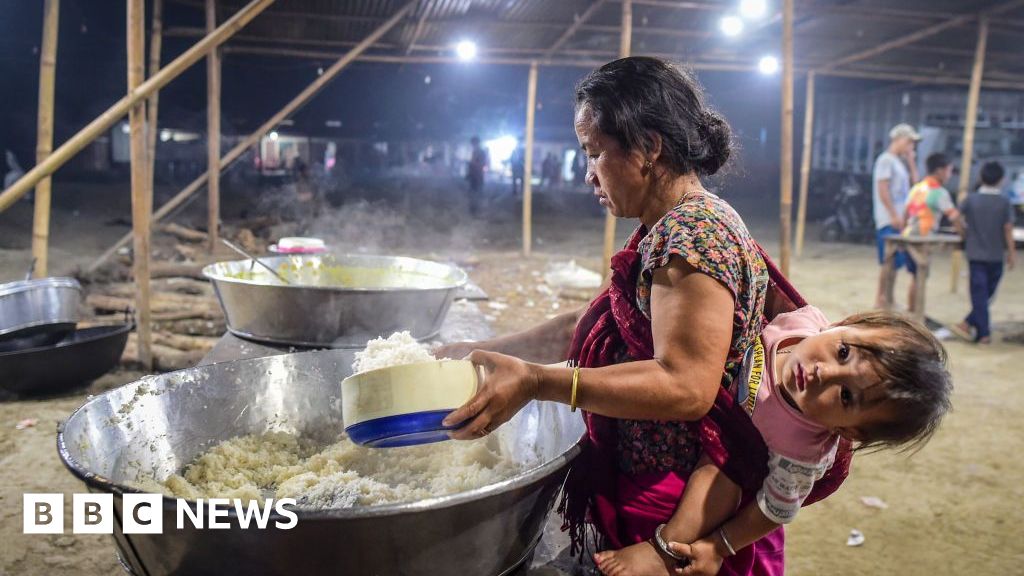Waiting for peace in Indian state divided by violence
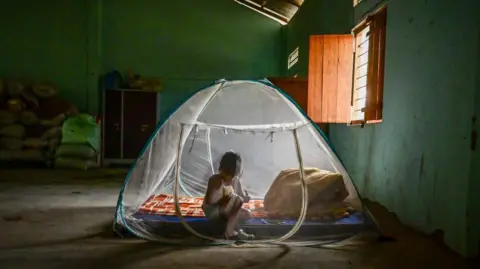 Getty Images
Getty ImagesMore than a year has passed since a deadly ethnic conflict devastated homes and claimed over 220 lives in India’s north-eastern Manipur state. But its more than three million residents are still waiting for peace.
Clashes erupted in May last year between the majority Meitei and indigenous minority Kuki groups – they were sparked by Kuki protests against demands from Meiteis to be given official tribal status, which would make them eligible for affirmative action and other benefits.
The violence displaced tens of thousands – some 59,000 people are still living in government relief camps. It has split up neighbourhoods and torn apart bonds between communities.
Today, Manipur is divided into two camps, with Meiteis inhabiting the Imphal Valley and Kukis living in the surrounding hill areas. Borders and buffer zones guarded by security forces separate the two regions. Many locals have voluntarily taken up arms – some stolen from armed forces, some country-made – to protect their villages from intruders.
Federal and state officials have made some attempts to end the conflict by holding peace talks between the communities, but locals say it hasn’t been enough – a recent peace deal signed in a district collapsed within a day. Distrust between the two groups persists and incidents of violence, including killings of security personnel, are regularly reported.
“The situation in Manipur is still tense and full of mistrust because people have to be confident about moving forward – and to move forward, there has to be some resolution of the past. There hasn’t been one,” says Sanjoy Hazarika, a commentator and author who specialises in India’s north-eastern states.
Both communities blame the other for stoking violence.
The state government and the Meitei community have frequently blamed illegal immigration – especially from neighbouring Myanmar – for the conflict. The Kuki community, which shares ethnic ties with the Chins in Myanmar, say this narrative has been used to target them within their own state.
“The state needs a full-fledged intervention: militarily to stop the violence and psychologically to start negotiations. The establishment of trust [between Kukis and Meiteis] is crucial. Trust cannot be built in a day,” says Shreema Ningombam, a political analyst in Imphal, the state capital.
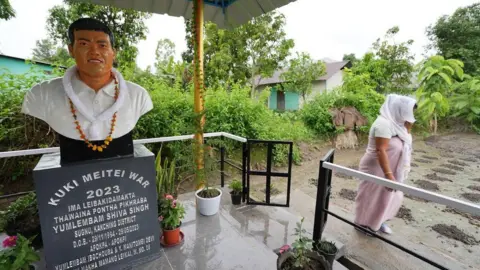 Anshul Verma
Anshul VermaIn Sugnu village, about 60km (37 miles) from Imphal, the divide is stark.
It was once home to both Meiteis and Kukis, but the latter fled to the surrounding hills after the conflict began, leaving behind burnt and ransacked houses.
Despite heavy security, locals fear retaliatory attacks from “outsiders”. Meitei women groups, known as Meira Paibis, guard village entry points.
Yumlembam Manitombi, one of the guards, said she lost her 29-year-old son in last year’s violence. He was the eldest of her three children and the sole provider for the family.
They have installed a bust of him in the courtyard of their house. An engraving below the bust marks the reason for his death – it says Kuki Meitei War 2023.
“I want peace. Ending this war is my sole wish and I seek nothing more,” Ms Manitombi says.
United in sadness
In Churachandpur, the Kuki-dominated epicentre of the conflict, similar security measures exist. The entrance to the city features a “Wall of Remembrance” commemorating Kukis who died in the conflict.
Boinu Haokip and her family fled from Sugnu to Churachandpur last year to escape violence and now survive on odd jobs.
Ms Haokip, who is pursuing a degree in ethnic violence in Manipur, says her future looks bleak.
“I have to study and look after my family. Our society was in poverty for generations. We had begun coming out of it, but this violence has pushed us back at least a decade,” she says.
Questions about the future haunt others too as schools become makeshift camps. People have lost businesses, land and jobs and exhausted their savings.
The conflict has also forced some to flee to camps in the neighbouring state of Mizoram. With shortages of food, water, and medicine, people rely on odd jobs to survive.
Nengnei Chong, 52, fled with her two sons and has been living in a relief camp outside Mizoram’s capital Aizawl. But she says she regrets her decision to leave.
“It would have been better had we too died back home,” she says.
Mizoram lawmaker TBC Lalvenchhunga says the state government has limited resources.
“The government is financially struggling. If the federal government heeds our repeated requests [for more funds], we can help the refugees better,” he says.
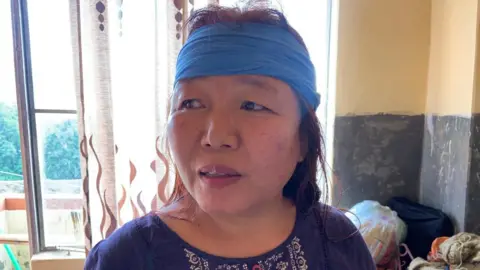 Dilip Kumar Sharma
Dilip Kumar SharmaPolitical blame game
Locals accuse the Bharatiya Janata Party-run Manipur and federal governments of not doing enough to quell the violence.
Kuki groups have accused state authorities of ignoring violence by Meiteis for political benefit, which the government denies. Opposition parties say federal government let the conflict rage on for too long. The Congress party has repeatedly criticised Prime Minister Narendra Modi for not visiting Manipur.
“Our government is making serious efforts to bring back normalcy in Manipur. Schools, colleges and offices in most places have opened up and are functioning. The hope for peace is visible,” Mr Modi said in parliament recently.
But experts say mistrust between the two communities has only hardened and the divide has deepened with the Kukis steadfastly demanding a “separate administration”, something the Meiteis vehemently oppose.
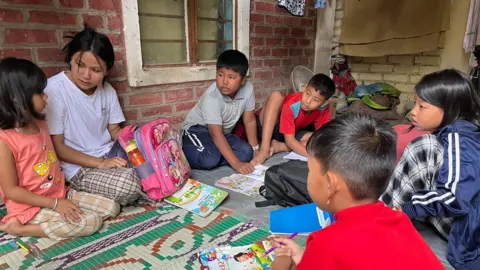 Mayuresh Konnur
Mayuresh Konnur“Peace-building is a very painful and slow process. It is easier to indulge in violence than to build peace. If the centre [federal government] is able to bring both sides to the table, it will be a step in the right direction,” Mr Hazarika says.
But he cautions that this won’t be a quick process.
“Healing needs time and patience before you can really move forward.”
With inputs from Dilip Kumar Sharma in Mizoram




